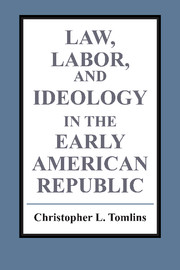Book contents
- Frontmatter
- Contents
- Preface and acknowledgments
- Prologue: two moments of the republic
- PART 1 LAW AND THE FACTS OF AMERICAN LIFE
- PART 2 LAW, LABOR, AND STATE
- PART 3 LAW, AUTHORITY, AND THE EMPLOYMENT RELATIONSHIP
- An interlude: on law and economy
- PART 4 THE NEW INDUSTRIAL ORDER
- Epilogue: “free Ameriky”
- Index
An interlude: on law and economy
Published online by Cambridge University Press: 05 August 2012
- Frontmatter
- Contents
- Preface and acknowledgments
- Prologue: two moments of the republic
- PART 1 LAW AND THE FACTS OF AMERICAN LIFE
- PART 2 LAW, LABOR, AND STATE
- PART 3 LAW, AUTHORITY, AND THE EMPLOYMENT RELATIONSHIP
- An interlude: on law and economy
- PART 4 THE NEW INDUSTRIAL ORDER
- Epilogue: “free Ameriky”
- Index
Summary
A very short chapter, containing infinitely more time and less matter than any other in the whole story.
Epigraph to Chapter 7 of Henry Fielding's The Life of Mr. Jonathan Wild, The GreatOne of my chief concerns while writing this book has been to avoid the imputation that there existed a functional relationship between “the needs of capitalism” and the legal discourses construing labor and employment to which courts and treatise writers had resort in the early republic. This is not because I believe that law had no significance for the processes of industrialization and capital accumulation under way during the first half of the nineteenth century. Indeed I think it was of vast significance. What I would wish to deny is simply the implication, as I put it at the outset, that this significance lies in a relationship that is unilinear and founded in the economy. What is “law” at any given moment is determined by legal discourse's own rules of formation rather than by its proponents' obedience to an overweening exterior influence. Law's relationship to economy, as to any social process, is hence mediated by the particularities and anomalies of its own process of creation.
- Type
- Chapter
- Information
- Law, Labor, and Ideology in the Early American Republic , pp. 294 - 298Publisher: Cambridge University PressPrint publication year: 1993



